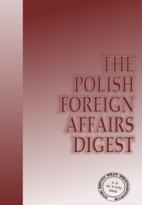

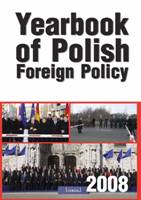
Among the most important elements of Poland’s foreign policy are its relations with the Federal Republic of Germany. The subject is both delicate and complicated, and Polish political parties have failed to achieve a consensus on it, as was clearly visible in 2007.
More...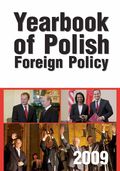
Keywords: United States; Poland policy foreign
Relations with the United States are among the most important elements of Poland’s foreign policy. Issues that affected Poland’s policy towards the United States in 2008 included long-term questions and processes as well as factors that have a short-term, although not necessarily less intense, impact on this policy.
More...
Keywords: Economic Relations
Poland enjoyed strong macroeconomic performance in 2008, with a GDP growth rate that placed it among the EU’s top performers and with an unemployment rate down to the single digits. The remaining macroeconomic indicators, including the budget deficit, inflation, and interest rates, were affected by external factors, in particular by the global financial crisis and its increasingly strong spillover into the real economy. Unlike in the first three quarters of the year, when Poland’s macroeconomic stability and still-strong outlook for economic development had a positive influence on the development of its external economic relations, in the fourth quarter, symptoms of a recession in countries that are Poland’s major economic partners as well as deteriorating economic performances in some Central and Eastern European countries hurt the growth of foreign trade and direct investment inflow to Poland.
More...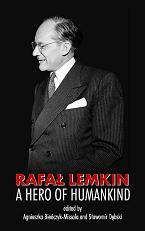
Keywords: Lemkin; genocide; convention; humanity; crime;
In the following article we would like to clearly indicate the three basic stages of Raphael Lemkin’s life journey that are contained in the slightly longish title. It reflects: sustained academic progress in good and, finally, excellent financial circumstances in Poland until 1939; peak of creative achievements and international recognition in the mid-1940s in the United States and Western Europe; and a depressing lapse into semi-oblivion and penury in the 1950s in New York.
More...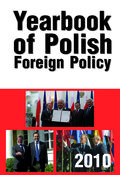
Keywords: Poland; United States
Poland’s policy towards the United States on the threshold of 2009 was determined predominately by the change of administration in the U.S. and the re-evaluations of U.S. policy which came in its wake. The difficult situation inherited from the George W. Bush’s team, with the disappointing progress of the Afghan campaign, the challenges arising from Iran’s nuclear programme, and the task of further reducing the American presence in Iraq, had the strongest bearing on the directions of President Barack Obama’s international activity. Another priority of the new administration was to counteract the repercussions of the deep economic crisis, both in the domestic and in the international dimension. Given the scale of these challenges, the Obama administration announced that it proposed to accord priority to multilateral activities and to enlist cooperation of key allies (the European Union, the NATO members) and international partners (notably China and Russia). It also declared it would pursue an active policy on issues neglected during the G.W. Bush presidency (the Middle East conflict, the counteracting of climate change).
More...Keywords: counterinsurgency; deportations; decolonization; armed rebellion; Cold War
This article considers in a comparative historical and strategic perspective the large-scale deportations of restive populations during the Malayan Emergency, the Algerian War and the Romanian anti-communist rebellions. The failed American campaigns in Iraq and Afghanistan witnessed a rebirth of military and academic interest in post-war counterinsurgencies (COIN), with an entire “COIN school” being put in charge of the two wars from 2006 to 2011. This particular school elevated the experiences of late colonial warfare, notably the French experience in Algeria and the British campaign in Malaya to the status of policy guides for the early 21st century world. However, one crucial aspect of these was not considered, both theoretically and militarily, for obvious political reasons. Both these conflicts witnessed large-scale deportations, amounting to between a fifth and a third of the population of these colonies. The democratic governments in London and Paris, signatories of the Universal Declaration of Human Rights, dislocated millions of their subjects, destroyed their property and forced them to live in poverty and food deprivation in guarded settlements and concentration camps, undergoing interrogations, torture and systematic brainwashing. In Eastern Europe, following the Soviet example but with striking similarities with democratic countries, the government of Romania launched a similar program to defeat rebellions. This article considers the role of this “forced” mobility in shaping military victory in the three cases and argues that just by itself this aspect invalidates the strategic and political relevance of them for shaping COINs waged by democratic governments.
More...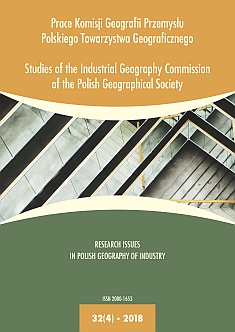
Keywords: conditions for the development of enterprises; industrial company; industrial plant; spatial structure of industry;
In the process of shaping particular academic disciplines, there is a need to synthesise the existing research results and on their basis propose new methodological approaches and indicate the possibility of applying new directions of theoretic-cognitive and application research. This is the idea to which the theme and purpose of this paper refers. It proposes a new holistic research concept. The first part of the article reviews the hitherto research problems concerning the operation of an industrial plant (enterprise). Presented are the changing research concepts that initially treated the industrial plant as a landscape element, and then as a production plant affecting the processes of industry concentration, as well as socio-economic and cultural changes of the surroundings. In the second part, in the light of the theory of the dynamic system, the assumption was made that an industrial enterprise is not an isolated element of geographical space, but one of its functional components. Its role changes under the influence of endogenous and exogenous factors, as well as in the process of civilisation development. Using the idea of a dynamic system and the model of the functioning of geographical space, a new, holistic concept of research into the operation and development of an industrial enterprise is proposed. It includes various relationships: between the enterprise and the elements of geographical space (natural, socio-economic, cultural), between the rules of economic development, between different functional types of enterprises, competitive, between the categories of the environment, between the power elites and types of policies. The proposed model approach makes it possible to define various relations with the enterprise and allows for a comprehensive understanding of its functioning in a diversified surroundings, and it provides for the definition of a more precise strategy for its development.
More...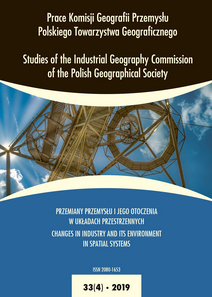
Keywords: competitiveness; enterprises; innovation; SME sector;
In the 21st century economy, referred to as the knowledge -based economy (KBE), the competitiveness of a business and its position depends, to a large extent, on innovations in the products and services it offers. In the EU countries, the entities that are referred to as its “driving force” are businesses belonging to the SME sector (small and medium sized enterprises). Therefore, the subject matter of this study is the competitiveness and the innovativeness of those enterprises in Poland after the country’s accession to the EU structures, i.e. after 2004. The paper discusses the very notion of innovativeness and competitiveness of a business, pointing to the factors shaping the influence of innovation on its competitive position. The realisation of changes that are connected with the innovative activity of a businesses is understood as the ability to implement improvements regarding products, processing, marketing and organisation. The paper presents the types of innovations, as well as their possible effects that affect the position of a business on the competitive market that is changing dynamically.
More...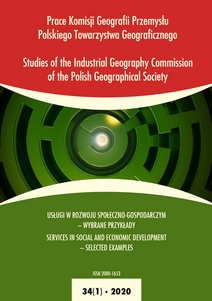
Keywords: competitive positions; ranking score of competitiveness; restaurant business;
Intensification of competition in restaurant business is accompanied by the emergence of a large number of competing dining establishments in both domestic and foreign markets, the increase of market requirements that force restaurants to continuously develop their strategic potentials, seek for various options for their effective work and create new competitive advantages. Availability of such advantages in restaurant industry is among the most important preconditions to obtain the surplus and develop business, which determines the relevance of the present research. Thus, the present study is aimed at demonstrating the ways of helping an increase of the competitiveness and efficiency in public catering establishments in present-day conditions of economic management. The authors discuss the concept of competitive advantages, analyse the results of the assessment of restaurant competitiveness (60 restaurants of Chernivtsi have been assessed), and suggest criteria to help rank the restaurant-type establishments of Chernivtsi by indicators of their competitiveness. The company’s total rating combines all important parameters (indicators) of financial and economic activity, marketing, investment, production activities, etc. Rating of competitiveness makes it possible to see which the best restaurants are, as well as to determine further goals and steps for those who gained fewer points. These goals and steps include: efficient use of available potential; definition and expansion of the range of products; up-to-date serving; development and introduction of new forms of service; development of customer-oriented complex of restaurant services based on the study of customers’ habits; increase of staff competitiveness; reduction of restaurant expenses; attraction of new customers by way of modern advertising campaigns, etc.
More...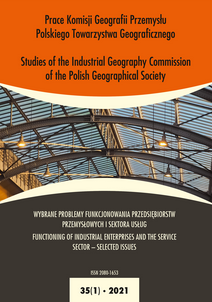
Keywords: cluster; innovation; internationalisation; knowledge-based economy;
In the modern world, the economic development is created mainly by two factors: knowledge and innovation. The main tool of innovation support is a cluster. The basic factor determining the level of innovation in the economy is the ability to cooperate with individual business entities. Since the 1990s, it has been frequently emphasized that clusters provide almost perfect conditions for the development of innovative processes. They may play an important role in generating and accelerating innovation processes and act as growth poles for regional, national and international economy. An important trend in the development of cluster initiatives, which is now becoming more and more important, is their internationalisation which is dynamically progressing. Internationalisation of clusters is reflected in the strategic documents and is supported by the economic policy. The aim of the article is to indicate contemporary conditions for the development of innovative integration connections and to present the processes of internationalisation of clusters. The study presents the concepts of the cluster and definition standards, as well as the achievements of the policy of supporting clusters, including their internationalisation. The added value of the article is the analysis of the importance of cluster cooperation for the internationalisation of enterprises. The study illustrates the existing relationships between clustering and internationalisation. To achieve the goal, a query of domestic and foreign literature in the field of research issues, as well as analysis of secondary sources of information were used. The issues discussed in the article may constitute a starting point for further in-depth research.
More...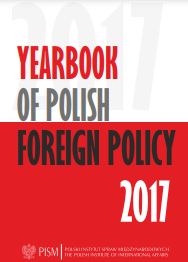
Keywords: Poland; foreign policy; Middle East; North Africa; 2017;
The years 2016 and 2017 in the Middle East and North Africa (MENA) were characterised by five main processes: the war in Syria, the fight of the international coalition with the terrorist organisation, the so-called Islamic State (ISIS), fluctuations in migration in the region and to Europe, qualitative changes of governments in Turkey, Egypt, and Saudi Arabia, as well as a rivalry of regional powers. Each of these processes had non-regional implications.
More...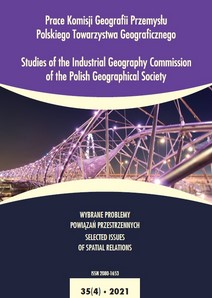
Keywords: circular economy; circular motives; statistical analysis; quality of life;
The main aim of the paper is to analyse and evaluate the possible relation between circular behaviours undertaken by the households and the socio-economic features describing them. The paper presents the results of the author’s research conducted among Polish households on the territory of two voivodeships: Podkarpackie and Małopolskie. In the article, the author presents the concept of circular behaviours (understood as an element of pro-ecological behaviours), as well as the result of the preliminary analysis of the frequency of exhibiting those behaviours in the households. This analysis is based on evidence regarding the possible differences between the households due to their distinct features. To indicate the possible differences the Chi2 Test of Independence was used. Obtained results indicate that some socio-economic features may have an influence on the frequency of conducting circular behaviours. It could be important due to the establishment of supporting activities aiming at increasing the overall level of circularity among households (as an economic sector). This article is the fourth one in the publication series devoted to circular economy and sustainable development matters.
More...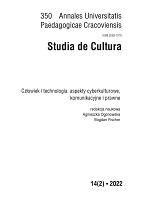
Keywords: ambient marketing communication; guerilla marketing; new technologies; creativity; originality; effectivity;
This paper introduces unconventional forms and technology of digital communication, which guerilla and ambient marketing communication utilize to implement strategies of communication with clients. It presents specifics of the mentioned types of communication, pointing out creativity and its remarkable unique attributes (originality, the element of surprise, effectivity and others). In our selection of 300 respondents, differences in subjective perception of attributes were identified in ambient marketing communication and in classical creative form of marketing communication. Our paper characterizes strategies and visual techniques used in them, and new technologies implementing the element of surprise for creation of positive emotions. With the use of selected examples, we illustrate possibilities for digital communication with implemented communication strategies. At the end, we offer our own synthesized scheme of creativity levels in marketing communication addressing the special importance of creativity, with a regard to the new technologies and with an investigative approach towards the ambient and guerilla marketing communications using these new technologies at the set levels.
More...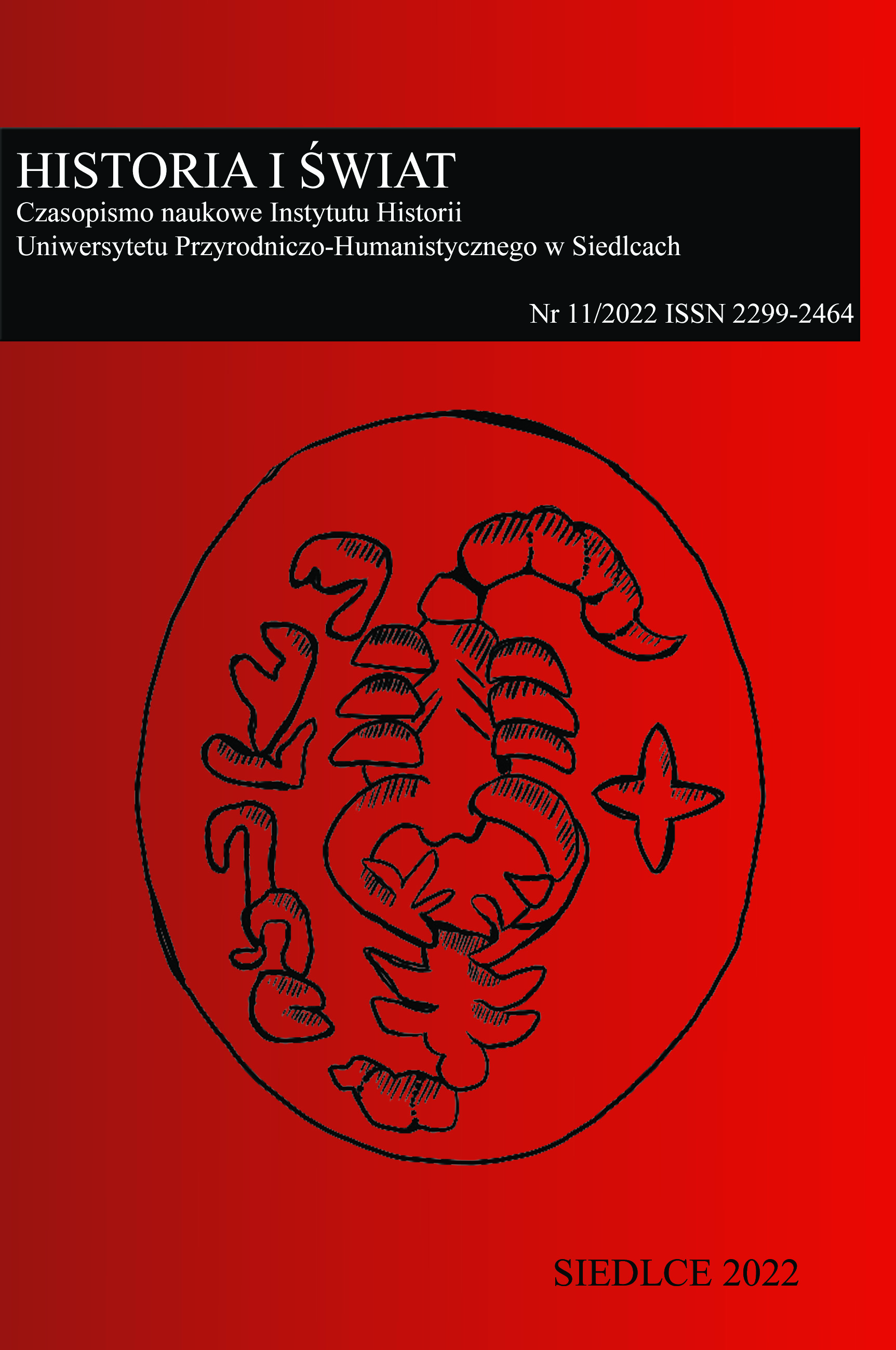
Keywords: Central Committee of the CP(b)K; Xinjiang; special folders; migration; defectors; nomads
The central party organs dealt with all issues of the internal and foreign policy of the republic, led the national economy, public organizations, and personnel policy. Therefore, the documents of the ‘special folders’ of the Central Committee of the Communist Party (b) Kazakhstan reflect various spheres of the life of the republic, which for a long time were not available to researchers due to the highest secrecy stamp imposed. The article deals with one of such areas of the problem – the settlement of Kazakh repatriates and representatives of other nationalities from China, who left during the civil war, collectivization, famine and repressions, who, unable to withstand the attitude of local residents and the persecution of the authorities of the country, republic or regions to which they moved, returned back to Kazakhstan. The ways of solving problems related to their settlement in Soviet farms, organization of trade with them, their cultural services, medical care, their resettlement, maintenance and veterinary services for their livestock are analyzed. Authors describes the reasons and measures to prevent the mass return of "nomads" back to China, despite all the decisions taken, the measures taken by the leadership of the republic in connection with the gaps made by some representatives of local authorities during their placement.
More...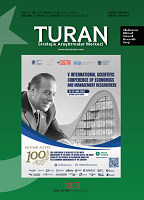
Keywords: CPI; world oil prices; FMOLS; DOLS; CCR; Engel−Granger; ARDL;
This study assessed the role of oil in the economy and the impact of the oil factor on the CPI in Latvia. Azerbaijan and Uzbekistan. The study covers the period1997–2021. To do this, an empirical analysis will be carried out, which will allow us to draw conclusions about the existence of a relationship bektween these variables and the possible nature of this relationship. Inflation is based on CPI (in relation to the previous one −%). This indicator is published monthly on the official website of the Central Statistical Bureau of Latvia, State Statistics Committee of the Republic of Azerbaijan and Statistics Agency Under the President of the Republic of Uzbekistan. The CPI reflects the change in the price level in the economy, which makes it possible to draw conclusions about the dynamics of inflation in the country over a certain period of time. In the model under consideration, this variable acts as a dependent variable. As variables in the study, the CPI in Latvia. Azerbaijan and Uzbekistan by years and the average world oil price by years, USD/bbl were used and taken. Short−term, long−term, and strong associations between variables were also calculated. The results of the study showed that the CPI in Latvia. Azerbaijan and Uzbekistan depends on the world oil prices, and fluctuations in world oil prices functionally affect CPI. The results of the conducted research can serve as a scientific basis for the economic policy of the state aimed at reducing the impact of external oil price shocks on the economy.
More...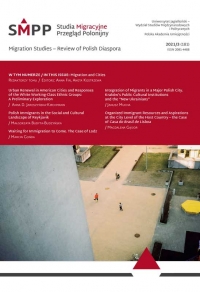
Keywords: Polish Americans; Seattle; ethnic community; urban sociology
The text presents the preliminary results of the ongoing research on the Polish American community in Seattle, Washington. So far overlooked by the historians of the Polish American experience, the local group differs significantly from other centers of the Polish diaspora in the US. Poles settled in the Pacific Northwest from the late nineteenth century onward, and they developed in the city and around it a strong community that is internally diversified. In Seattle they were confronted with German, Irish, and Jewish groups, as was the case in other American cities, but also with other immigrants, for example with numerous Asians, Nordic people, Croatians, and Bulgarians. Contrary to the patterns of the Polish American community building, there has never been a Polish neighborhood in the city, and the Polish Roman Catholic parish was founded in Seattle as late as 1989. In fact, the parish never gained a crucial importance in the local ethnic community, and presently, as it used to be in the past, the immigrant life is organized around the Polish Home that was launched by the pioneer immigrants in 1918/1920. Many descendants of the earlier immigrant generations participate in the events initiated in Seattle by Poles who arrived in the last decades, and several recent immigrants became involved in the Polish Home Association. Moreover, web platforms – new forms of ethnic connection that developed in the last decades, contribute to the increase of the bonding social capital within the Polish group.
More...
Keywords: Casa do Brasil de Lisboa; immigrant association; Brazilians in Lisbon; integration
This article looks at the Brazilian migrant association founded in 1992, functioning in the capital of Portugal, Casa do Brasil de Lisboa. Its origin is connected to the period of the first numerous stream of Brazilians coming to Portugal, the colonizer of their homeland in former times. Knowing that migrant networks are of great value to the process of immigrants’ integration into a host society – and a local community as well – Casa do Brasil de Lisboa is very active in this field. For instance, in partnership with the Lisbon City Council, this association offers guidance on the legalization of stay, and access to public and private services in Portugal. However, a large number of tasks undertaken by Casa do Brasil de Lisboa go far beyond this kind of guidance. Two editions of the project Migrante Participa (Migrant Participates) are a clear illustration of it. Each edition created opportunities to meet, gain knowledge, and share opinions on migratory process issues in the context of Portugal and Lisbon as well, encouraging political participation at the local level, for example. Casa do Brasil de Lisboa is also active in the field of culture, promoting Brazilian artists. What is more, this association is not closed for other nationalities and collaborates with various entities. To be more specific, therefore, the focus of this text is on presenting Casa do Brasil de Lisboa as a dynamic immigrant association working on increasing the level of integration and reducing the phenomenon of individual marginalization within the Lisbon community. As a theoretical framework of this text serves the concept of immigrants’ integration of Rinus Penninx.
More...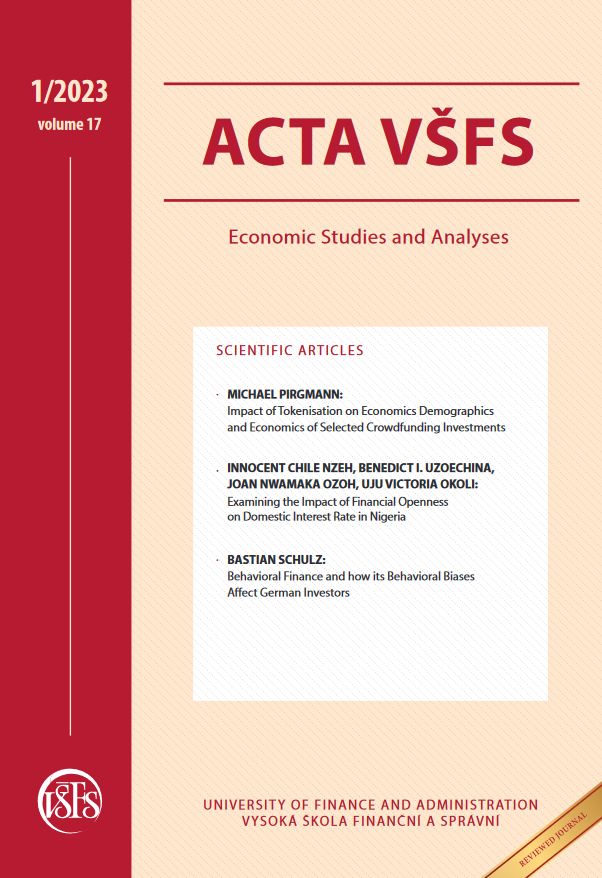
Keywords: digital competency Framework; extended workforce; hybrid work models; intelligent bots;remote work; strategic remote work arrangements
In today's digital age, organizations increasingly leverage an extended workforce ekosystém incorporating freelancers and even intelligent bots with employee ID cards to bolster their operations. This article examines the advantages and challenges of these ecosystems, offering a roadmap for organizations to effectively navigate the shift towards hybrid and fully remote working models. The successful realization of this transition heavily relies on the shared attitude towards education and learning within the extended workforce ecosystem. Drawing upon data obtained from the observational study MML-TGI, the aim of which is to assess and interpret the adoption levels of educational content and identify sociodemographic segments of consumers suitable for targeted educational content, this article presents insights into the current population attitudes towards education and learning, which hold crucial implications for designing employee training programs. The primary objective of this article is to provide organizations with comprehensive and research-based knowledge, enabling them to transition from reactive ad hoc remote work arrangements to a more sustainable and effective hybrid work approach. By acting as a bridge to the future, this study facilitates the transformation towards a strategic and intentional approach to hybrid working models that align with the needs of both employees and the organization.
More...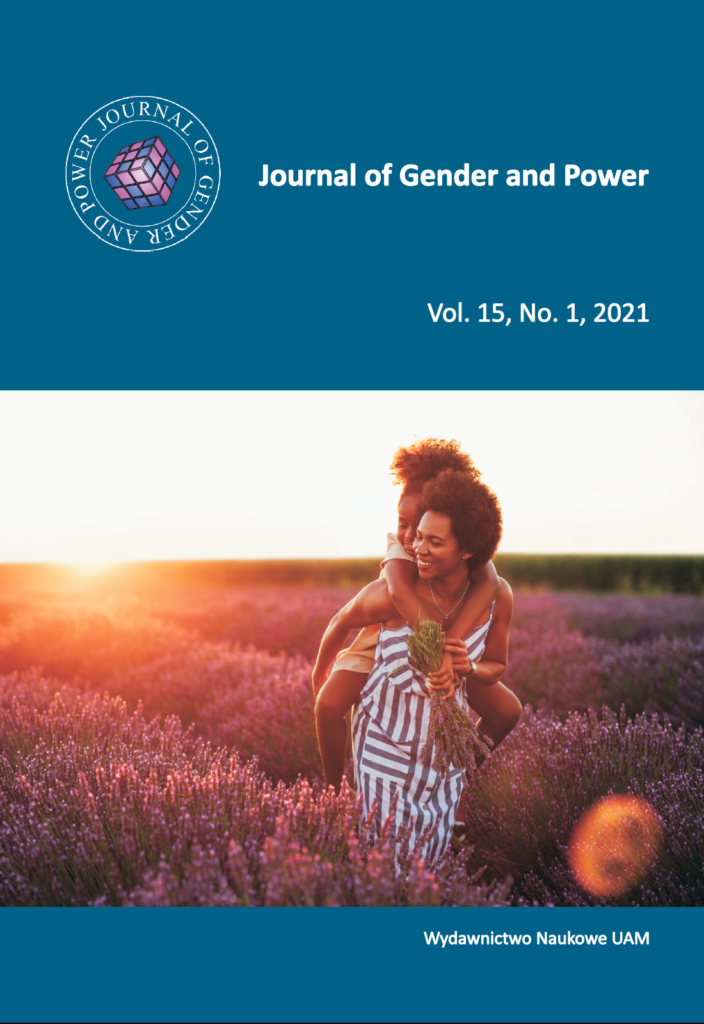
Keywords: sustainability; energy; gender; household; quality of life; Kathmandu;
Sustainability has become a global topic and is pursued in all countries along South Asia—Nepal, that it has become part of the political agenda, specifically visible in Kathmandu, the country’s capital. Household is one of the highest energy-consuming sectors, and women have a higher responsibility for household chores in most cases. However, women are still lagged in the energy sector. The energy studies are more focused on technical policy with limitations of the gender lens. This study analyzes energy, gender, and sustainability interlinkage as a common goal and identifies the economic, environmental, and social sustainability of energy consumption from a gender perspective in Kathmandu’s. The findings show that female participation in energy de- cisions is likely to increase in female-headed families. Kathmandu urban women still have lack of knowledge, the right information, and affordability. The overall sustainability study indicates that the energy policy needs to be a gender-neutral policy. Conclusively, innovative technical interven- tions can be combined with the subsidy, increase women’s participation to reduce inequality, en- courage efficient cooking technology to reduce the nation’s financial burden.
More...